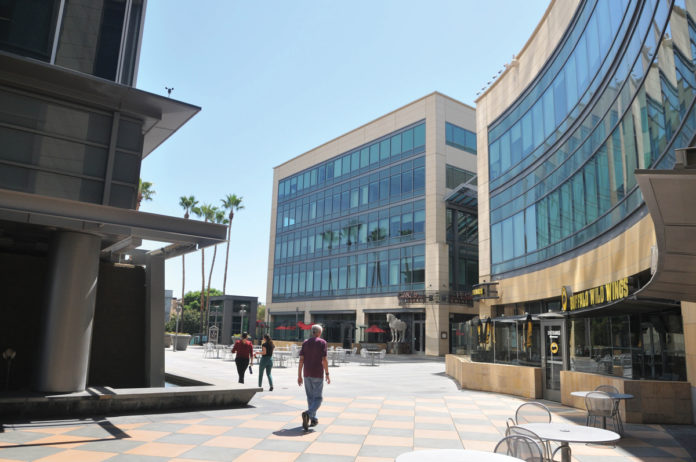Hertz Investment Group, a Valley-based private equity commercial real estate firm, has moved its headquarters from Woodland Hills to the Comerica Bank building at the Sherman Oaks Galleria Business and Lifestyle Center.
The move represents an office-size reduction from 15,000 to 10,000 square feet.
“It’s definitely more of a centralized location with a lot more amenities surrounding the property,” said Zev Hertz, chief executive officer and president, who oversees a portfolio of more than 21 million square feet of office space.
Now that the company has settled into its new location, it can continue to focus on its operations, which spans 21 cities nationwide.
Robert Licht, chief financial officer of Hertz Investment Group, said there is a lot of internal consideration that goes into where the company invests in an office tower, including whether the asset is based downtown or in a suburb and whether is it a best-in-class product.
“We generally focus on Class A office product, mostly in secondary U.S. cities,” Licht said. “We have five office towers in the business district in New Orleans. We’re one of the largest and most powerful landlords in New Orleans.”
Certain cities are doing better than others for the company.
“New Orleans is a home run for us,” Licht said. “Pittsburgh is a home run for us now, Pittsburgh was struggling for three or four years, (but now) we’re doing an incredible amount of leasing in Pittsburgh.”
Hertz said that Knoxville, Tennessee, and Grand Rapids, Michigan, have become strong performers as well.
“Knoxville has strong affordability, low taxes in the state, a lot of economical growth, good quality of life,” Hertz said. “Nashville has become so expensive so the whole city is seeing an uptick in economic activity.”
The copany does not flip office buildings.
“We’re generally a long-term holder. That’s generally our structure,” Hertz said. “We don’t like to sell assets where we have a strong presence in the market.”
Licht said the business strategy reinforces stability for the company’s 250 investors.
“A lot of funds have a sunset provision, which means the fund has a defined lifespan and it’s going to end at a certain date in the future unless the investors vote to extend that date,” Licht added. “We don’t really have that, so we’re not forced to sell assets or wind down in any way, shape or form. By the same token, we don’t have to buy things. There’s no quota.”
“It’s a less risky venture when you don’t have a quota,” he added.
Hertz’s buildings stayed open during the pandemic but occupancy took a hit as large swaths of the workforce stayed at home.
“We not only have office towers, but we have adjacent parking garages,” Licht said. “It’s a handy litmus test to see are your tenants all back in the buildings.”
“During the pandemic, our largest pain was in our parking revenues, which dropped off significantly because tenants didn’t go to the office,” Hertz said. “We’re currently about 80% back on our parking revenues.”
“If we look at our parking operations, we can tell where things are at,” Licht added. “We’re between 82% to 87% of pre-pandemic levels. It is coming back in a strong way but it’s not entirely back yet.”
And when it does come back, it’s going to be different.
“We can’t ignore that this hybrid work model is evolving and that employees want more flexibility now than ever before,” Licht said.
